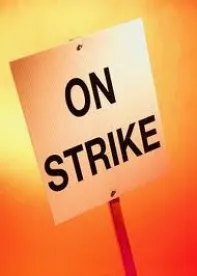A national coalition of labor unions and social justice groups is calling for a nationwide strike on July 20, 2020, to publicize issues of racial equality and police treatment of minorities.
Branded the “Strike for Black Lives,” the sponsors want employees to strike the full day, but those who cannot do so are encouraged to walkout for about eight minutes, the length of time a Minneapolis police officer pressed his knee against the neck of George Floyd, killing Floyd.
Marches and rallies are expected to be held in at least two dozen cities as well. The anticipated strikers (perhaps involving tens of thousands) are expected to consist largely of lower-wage, service sector employees who work in nursing home, fast food restaurants, and rideshare businesses.
Organizations Involved
Unions such as the Service Employees International Union (SEIU), the American Federation of Teachers, the International Brotherhood of Teamsters, and the United Farmer Workers, joined by organizations such as March On, the Center for Popular Democracy, the National Domestic Workers Alliance, and the Movement for Black Lives are participating.
Organizers want corporate and government leaders to address systematic racism for Black and Hispanic workers by improving opportunities for career advancement and assuring affordable healthcare and guaranteed sick pay for lower-wage employees, raising wages, and facilitating the unionization of non-union represented workers.
According to Mary Kay Henry, President of the two-million member SEIU: “We have to link these fights in a new and deeper way than ever before. Our members have been on a journey … to understanding why we cannot win economic justice without racial justice. This strike for Black lives is a way to take our members’ understanding about that into the streets.”
NLRB GC Guidance
The General Counsel (GC) of the National Labor Relations Board (NLRB), the NLRB’s chief prosecutor, has noted that political advocacy (e.g., participation in protests such as these) may fall within the National Labor Relations Act’s (NLRA) clause that protects employees’ rights to engage in concerted activity for “mutual aid or protection” (“protected concerted activity”) if the subject of that advocacy has a direct nexus to employee working conditions.
The GC took this position in connection with 2006 protests targeting Congress’ consideration of an Immigration Reform Bill. That led to a number of unfair labor practice charges being filed at the NLRB by employees who had been disciplined for participating in the protests. In order to help the NLRB’s Regional Offices respond to these charges, the GC issued guidance on this issue.
The GC took the position that the 2006 demonstrations fell within the scope of the “mutual aid or protection” clause because they were focused on proposed legislation that would impose requirements on prospective employees and employers before the prospective employees could work in this country.
Significantly, however, the GC stated that abandoning work to participate in the protests was not protected, because the employer had no control over the subject matter of the dispute (an Immigration Reform Bill). By contrast, abandoning work to go on strike for improvements in wages or benefits is protected because the employer has control over the subject matter of those disputes.
Based upon the GC’s analysis, even if the current protests are deemed to have a sufficient nexus to employee working conditions, employees who do not report to work, or who leave work, to participate in these protests during working time may be subject to the neutral and consistent application of lawful work rules and policies (such as attendance and absenteeism policies).
However, employers should consider that employees may participate in such protests during non-working time, including paid time (e.g., breaks or meal periods). In recent years, some employers have experienced this when employees joined local “Fight for $15” protests during breaks or meal periods.
Further, the work rules and policies to which protesting employees may be subjected must be non-discriminatory and neutrally applied. It is not enough for the rule or policy to be neutral and non-discriminatory on its face; its enforcement in practice must be consistent. This applies equally to requests for time off in advance; if an employer makes an effort to accommodate employee requests for time off for various personal reasons, it must do the same here.
Neither the NLRB nor the GC has given advice on Black Lives Matter specifically. While an employee may be able to argue successfully that walking off the job to join the protest should be protected under the NLRA, it is not certain because it is not clear there is direct nexus to employees’ working conditions. Unless a protest targets the employee’s specific employer, the argument that the protest does not constitute protected concerted activity under the NLRA may win the day. However, that does not mean employers should discipline employees who join such a protest.
Considerations
There are times when discipline that is legally acceptable is also practically unwise. The employees who choose to participate in these protests almost certainly view the issues in terms that are deeply personal. Each employer will have to decide how to respond under these circumstances.
One option is to communicate in advance with employees, acknowledging the significance of the issue and how the employer’s values dovetail with employees’ rights to form personal opinions and exercise personal choices. The communication also may acknowledge that a strike is planned, remind employees about the employer’s time off policies, and assure employees the employer will do its utmost to grant time off.
Some employers may want to take a different approach. Whatever an employer decides to do, it should be carefully considered. These are significant issues. Employers should consider this when making decisions about how to respond. The decisions around this issue should be carefully considered in the light of the current climate and the particular employer’s culture and values.
Collective Bargaining Agreements
The terms and conditions of employment of unionized employees are covered by a collective bargaining agreement (CBA). A typical CBA contains a “no-strike” clause that prohibits strikes during the term of the CBA. The employees who are covered by the CBA may violate that clause by striking during their work and, therefore, may be subject to discipline or discharge for doing so.







 />i
/>i
